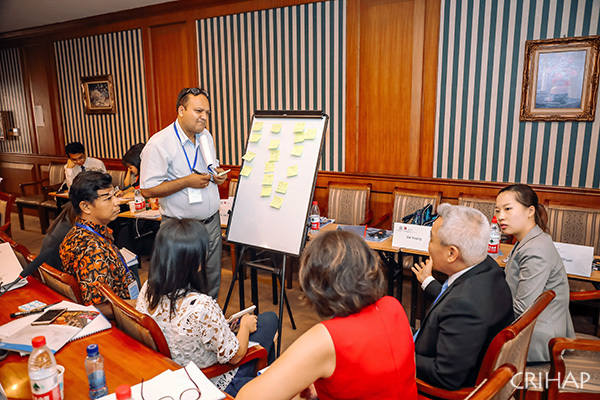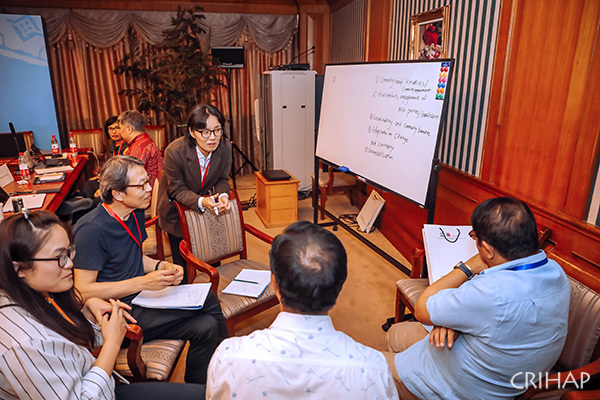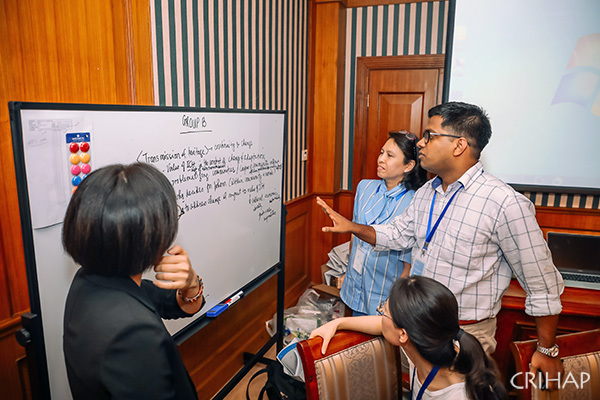Capacity Building Workshop on Linking 2003 Convention and University ICH Programs held in Shanghai
 |
| Group discussion. |
On Nov 2 to 3, 2015, UNESCO organized the first Regional Symposium on the Development of Post-Graduate Degrees Focusing on Intangible Cultural Heritage in Bangkok, Thailand. This meeting brought together 16 universities from 11 countries, coming from various disciplines and domains. This symposium resulted in the identification of many existing initiatives and resources, and highlighted the need for more information exchanges and collaboration among the tertiary education institutions in order to strengthen their ICH-related programs.
Building up on the preliminary conclusions of the symposium, UNESCO and the International Information and Networking Centre for Intangible Cultural Heritage in the Asia-Pacific Region (ICHCAP) partnered to conduct a comprehensive survey of current activities and needs of tertiary education actors in the Asia-Pacific Region. This survey was designed to generate an understanding of current activities and needs of tertiary education actors in Asia and the Pacific region. It also explored the feasibility of establishing a network of universities to deepen reflection on ICH in the academic world and to address a hypothesis raised during the 2015 meeting.
 |
| Group discussion. |
Building upon the encouraging findings of the survey, ICHCAP and UNESCO organized the first meeting with prospective members of the network on July 18 and 19 in Buyeo (Republic of Korea). The meeting was hosted by the Korean National University for Cultural Heritage on their campus. Representatives from 19 representatives of higher education institutions from 11 Asia-Pacific countries participated in the meeting. CRIHAP also attended the meeting as an observer. The sessions organized within the two days provided a great opportunity for meeting participants to learn about each other’s experiences in developing and teaching ICH-related courses, and together develop joint actions in which they can collaborate during the years to come. It was agreed by all meeting participants that a network was formed, officially entitled “Asia-Pacific Higher Education Network for Safeguarding Intangible Cultural Heritage”, or in abbreviated form, ‘APHEN-ICH’. Based on the objectives agreed upon, the network shall endeavor to meet biennially, to share knowledge and experiences through its platforms, to develop a work plan that is updated with member activities at least every two years, and to focus its activities on network interchange/collaboration, and cooperation with partners such as UNESCO and Category 2 centres in the field of intangible cultural heritage.
While all participating universities teach ICH in one form or another, it has become apparent through the meeting discussions that not all professors/lecturers share the same understanding of ICH as defined under the 2003 Convention. More critically, few are aware of the Convention and even fewer are aware of the wealth of capacity building materials that have been developed by the Secretariat. (The survey results showed that only about one-third of the responding universities refer to the Convention or use the capacity building materials in their programs). This shows an immediate need for an awareness-raising workshop to introduce the 2003 Convention to network members and to identify ways to link this Convention with teaching at their universities.
 |
| Group discussion. |
As the first training workshop linking the Convention with higher education, according to the needs of higher education institutions, this workshop has taught APHEN-ICH member universities of the principles and key messages of the 2003 Convention, as well as the materials developed under the Convention’s capacity building program. Based on what they learned during the workshop, the participants can revise their ICH courses to reflect the principles and key messages of the Convention, as well as its capacity building materials.

Address: 81, Laiguangying West Road, Chaoyang District, Beijing, China
Zip Code: 100021
Tel: 86-10-64966526
Fax: 86-10-64969281
E-mail: crihap@crihap.cn
Leave us your e-mail address, we'll let you know about current events.



